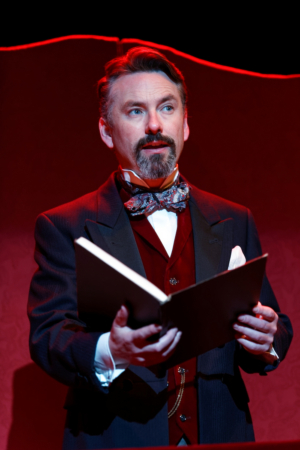Guest Blog: John O'Connor On Re-creating Charles Dickens' Performance Of A CHRISTMAS CAROL

Imagine if JK Rowling announced tomorrow that she was going to tour a one-woman show of Harry Potter in which she would play all the characters. I'm sure it would sell out in minutes, but would it be any good?
That is exactly what Charles Dickens did in the 1850s and 60s with A Christmas Carol and he was a total sensation. Far from 'reading' the story, he learned it, rehearsed it and turned it into an acting masterclass. He toured all over Britain and America, playing to audiences of two or three thousand every night. So successful was he that he made more money from these performances than from all his books and novels put together!
What would it have been like to have been in the audience? That was our starting point as we put together this show, which is touring to many of the places where Dickens performed himself. This is A Christmas Carol as told by the author, using his original script, his effects, and even some of his gestures and business. This is Dickens the performer - a man of phenomenal energy, imagination and charisma - not the austere gentleman we see staring out at us from photographs. There have been one-man versions of A Christmas Carol before, but the original and greatest was the one that Dickens performed himself.
While I am all for authenticity, and have tried my best to imitate Dickens' style of dress and mannerisms, there is one point at which I draw the line - preparation. This is how Dickens readied himself for a performance: two tablespoons of rum mixed with cream for breakfast, a pint of champagne for tea and, half an hour before he went on stage, a glass of sherry with a raw egg beaten into it!
%20-%20courtesy%20of%20David%20Bartholemew%20%20(7).jpg)
Some of Dickens' early readings of A Christmas Carol were in aid of Great Ormond Street Hospital, which he helped to set up. For that reason, we have partnered with GOSH to raise money for their brilliant work in the spirit of Dickens' story.
A Christmas Carol came out of the author's rage at an 1843 report into the horrific effects of the Industrial Revolution upon working-class children. Dickens' own childhood experiences of poverty (when his father was arrested for debt and 13-year-old Charles was sent to work in a factory) marked him deeply. His public readings were a way of passionately communicating this sense of social justice to a mass audience.
Does that still come across to audiences in 2019? Sadly, yes. We tend to think of child poverty as being a 19th-century problem, but the Social Metrics Commission estimates that there are four million children in the UK living in poverty today. After nine years of austerity, A Christmas Carol's themes of greed and want, compassion and forgiveness, welfare and social responsibility feel as horribly real as they did in 1843.
It's thankfully also a story of hope, love, forgiveness, family and redemption. It teaches us about the beauty of Christmas as a time to be together in peace. In a world as busy as this one, that's a powerful message, and it explains why audiences have flocked to see this show over the past four years. It's a joy and privilege to perform it in the spirit of Christmas, past, present and future; to make people laugh, cry and wonder at the magic of the story and the vivid brilliance of its author.
A Christmas Carol is on tour 27 November to 23 December - find more details here
Photo credit: David Bartholomew, Craig Fuller
Comments
Videos

